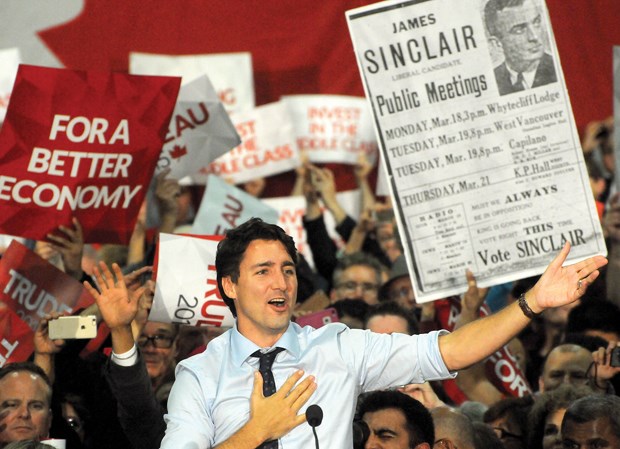The “red tide” washed up on the North Shore Monday night as all three ridings went to the Liberals.
Green tech CEO Jonathan Wilkinson took North Vancouver from the Conservatives, as did former West Vancouver mayor Pamela Goldsmith-Jones in West Vancouver-Sunshine Coast-Sea to Sky Country and small business owner Terry Beech claimed the up-for-grabs new riding of Burnaby North-Seymour.
While pollsters were cautiously predicting a Liberal minority, few anticipated the 184-seat majority that swept the country. Much like the Harper government, Trudeau’s is also a “false majority” with less than 40 per cent of the popular vote but 54 per cent of the seats in Parliament.
The Conservatives will be the official Opposition, with 99 seats, although Stephen Harper will no longer lead them. The NDP, who portrayed themselves as a government in waiting when they enjoyed a rise in the polls six weeks ago, landed in third with 44 seats. The Green Party maintained their lone seat in Saanich-Gulf Islands and the Bloc Quebecois enjoyed a small bump in Parliament after being largely eliminated from Parliament since 2011.
UBC held a roundtable of professors from the political science department on Tuesday morning to dissect the results and what they might mean for Canadians.
At its root, the election was a referendum on Harper, and the Liberals proved to be the best at siphoning off support from both the Tory and NDP base, the profs largely agreed.
“Many voters in this election wanted change and they were clearly prepared to rally behind whoever appeared to be the most promising agent of change. In the course of the campaign, as it became clear that the Liberals had the best shot of unseating the Conservatives, I think a bandwagon began to form behind Justin Trudeau,” said Max Cameron.
The campaign also saw strategic voting and “unprecedented” mobilization of third-party environmental groups like Lead Now and the Dogwood Initiative promoting the “ABC” (anyone but Conservative) candidates, Kathryn Harrison said, although she noted it remains to be seen if the Liberals will be an acceptable alternative for those groups.
The profs also agreed that Trudeau’s “positive politics” resonated more with more voters. That became especially so as the Conservatives increasingly went negative in the close weeks of the campaign.
“I think people began to ask themselves ‘What kind of country do we want?’ and I think the narrative really began to shift on those terms. I think that frankly favoured Justin Trudeau because he was able to make such a stark contrast between his own style of politics and the really divisive, negative, polarizing politics of Stephen Harper,” Cameron said.
David Moscrop agreed, although he noted, going negative is usually a working strategy.
“(The Liberals) don’t seem vindictive. They don’t seem paranoid,” he said. “If you asked me in July whether or not that would have worked, I would have said ‘Not a chance. It’s never going to work.’ But that’s what happens. Things don’t work until they do.”
As for what this will mean locally, it puts into serious question whether Trudeau’s promise for a more rigid environmental assessment process will allow for Kinder Morgan’s pipeline proposal to be approved.
“We have yet to see what Canada’s greenhouse gas emission goals will be but 80 per cent of the emissions growth ... is coming from expansion of the tar sands. If that target gets built into the environmental assessment process, I think it will be very difficult to approve major new pipelines,” Harrison said.
That said, the party has also acknowledged a need to get Canada’s resources to market, Harrison added. “Energy East (an oil pipeline from Alberta and Saskatchewan to the refineries and port terminals of Eastern Canada) is the one the Liberals seem more supportive of.”
Also, Trudeau has committed to having 50 per cent of his cabinet positions occupied by women, which Harrison said would make Goldsmith-Jones a likely candidate.



